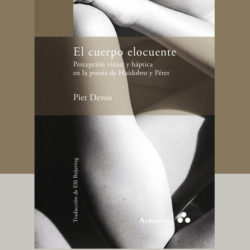
(The Eloquent Body: Visual and Haptic Perception in the poetry of Vicente Huidobro and Benjamin Péret)
by Piet Devos
2016
In this book, Piet Devos argues that the innovation of avant-garde poetry was closely linked to the subjectification of sensory perception in the early twentieth century. By 1900, most Western intellectuals no longer believed that the senses provide the observer with an objective reflection of an external reality.
Scientists, philosophers and artists acknowledged that sensory impressions rather result from psychosomatic processes and the cultural environment (such as technology, architecture or ideologies).
Avant-gardists referred to this epistemological devaluation or subjectification of sensory perception in order to legitimise the very particular outlook on things expressed in their own artistic creations. This legitimisation can for example be traced in the works of Guillaume Apollinaire and Gertrude Stein, but also more specifically in the writings of the less famous poets on whom this PhD thesis concentrates: the Paris-based Chilean Vicente Huidobro
(1893-1948) and the Frenchman Benjamin Péret (1899-1959). Huidobro and Péret presented themselves as exceptional observers who, thanks to poetry, were able to evoke the most surprising images and sensations.
For them, language served as an experimental medium to make alternative realities visible and tangible, meant to disturb the reader’s pragmatic perception of everyday life. Just like many other avant-gardists, Huidobro and Péret hoped that their idiosyncratic views would counter the instrumentalising effects on perception that mass culture and politics were believed to entail.

